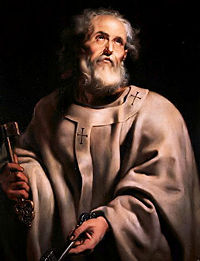Two Benedicts and Two Peters
User's Guide to Sunday, April 14.

Sunday, April 14, is the Third Sunday of Easter (Year C, Cycle I).
Two Benedicts
This April 16 is an interesting day. It is the birthday of Pope Emeritus Benedict XVI, who was Joseph when he was born, and it is the feast day of St. Benedict Joseph Labre.
St. Benedict Labre is sometimes called the "beggar saint" or "homeless saint." He traveled from French town to French town, dressed plainly, eating only what he was given. His greatest consolation was to kneel in front of the Blessed Sacrament in parish churches. He made a conscious effort to not act pious because he didn’t want to draw attention to himself. But people say that his face glowed when he prayed.
Our former Pope Benedict has become a little bit like that. When he stepped down from the Chair of Peter, he said, "I’m just a pilgrim who is starting the last part of his pilgrimage on this earth." And now, with no official role, he is "homeless," out of the spotlight, spending time with the Eucharistic Jesus he promoted so often.
Readings
Acts 5:27-32, 40-41; Psalms 30:2, 4-6, 11-13; Revelation 5:11-14; John 21:1-19 or 21:1-14
Our Take
A month later, the Gospel that is usually read at papal inaugurations will be read at today’s Mass. Instead, Pope Francis chose the readings for the feast of Joseph, husband of Mary, for his inaugural Mass on March 19.
But he seemed aware of the regular reading all the same, and he spoke about what today’s Gospel says about the papacy.
Today’s Gospel begins with Jesus reminding Peter of the day they met on the Sea of Galilee, when Jesus caused a huge haul of fish to be available to Peter, and Peter responded by saying, "Depart from me, Lord, for I am a sinful man." Then, Jesus reminds Peter of their meeting on the day he died, when Peter denied him three times in front of a fire — on that day, he literally was a sinful man who departed from Jesus.
Jesus re-enacts these two moments. He repeats his command to cast the nets, and then he gives Peter a chance to accept him three times beside a fire.
"Jesus’ three questions to Peter about love are followed by three commands," said Pope Francis March 19 in reference to this reading: "Feed my lambs; feed my sheep. Let us never forget that authentic power is service and that the Pope, too, when exercising power, must enter ever more fully into that service which has its radiant culmination on the cross."
The first reading shows how Peter lived that out. He is brought before the Sanhedrin and refuses to stop preaching about Jesus.
He no longer rejects God to impress men. Now, says the Gospel, he and the others "left the presence of the Sanhedrin, rejoicing that they had been found worthy to suffer dishonor for the sake of the name."
Peter and the apostles can do this because they are certain of the truth that John witnesses to in the second reading. God is king of the universe. He holds the future, and our lives, in his hands. John hears "everything in the universe, cry out: ‘To the one who sits on the throne and to the Lamb, be blessing and honor, glory and might, forever and ever.’"
In his first homily after becoming Pope, Francis spoke about how Peter — and he — learned that the glory we expect from Christ only comes from the cross. We have to expect the cross, too.
He concluded: "My wish is that all of us, after these days of grace, will have the courage, yes, the courage, to walk in the presence of the Lord, with the Lord’s cross: to build the Church on the Lord’s blood, which was poured out on the cross, and to profess the one glory: Christ crucified. And in this way, the Church will go forward."
Amen.
Tom and April Hoopes write from Atchison, Kansas,
where Tom is writer in residence at Benedictine College.
- Keywords:
- April 7-20, 2013
















